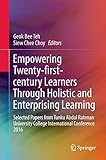Empowering 21st Century Learners Through Holistic and Enterprising Learning [electronic resource] : Selected Papers from Tunku Abdul Rahman University College International Conference 2016 / edited by Geok Bee Teh, Siew Chee Choy.
Material type: TextPublisher: Singapore : Springer Singapore : Imprint: Springer, 2017Description: XVII, 267 p. 28 illus. online resourceContent type: text Media type: computer Carrier type: online resourceISBN: 9789811042416Subject(s): Education | Curriculums (Courses of study) | Education -- Curricula | Educational technology | Education | Learning & Instruction | Curriculum Studies | Educational TechnologyAdditional physical formats: Printed edition:: No titleDDC classification: 371.3 LOC classification: LB5-3640Online resources: e-book Full-text access
TextPublisher: Singapore : Springer Singapore : Imprint: Springer, 2017Description: XVII, 267 p. 28 illus. online resourceContent type: text Media type: computer Carrier type: online resourceISBN: 9789811042416Subject(s): Education | Curriculums (Courses of study) | Education -- Curricula | Educational technology | Education | Learning & Instruction | Curriculum Studies | Educational TechnologyAdditional physical formats: Printed edition:: No titleDDC classification: 371.3 LOC classification: LB5-3640Online resources: e-book Full-text access | Item type | Current library | Collection | Call number | Copy number | Status | Notes | Date due | Barcode |
|---|---|---|---|---|---|---|---|---|
| E-Books | MEF eKitap Kütüphanesi | Springer Nature | LB5 -3640 (Browse shelf (Opens below)) | Available | NATURE | 1419601-1001 |
Preface: Proceedings of the TARC International Conference 2016 -- Introduction to Proceedings -- Contents -- Part I: Globalised Online Learning -- Chapter 1. Students' Satisfaction towards Online Learning Systems: Assessing its Internal and External Factors -- Chapter 2. Embedding Digital Literacies in Curricula: Australian and Malaysian Experiences -- Chapter 3. Better Assessment Through Video: The Development of An Assessment Productivity App.-Chapter 4. Using Technology Acceptance Model to examine the usage of information and communications technology among Nursing Students -- Chapter 5. Awareness of Safe and Responsible Use of ICT among students in a Malaysian University -- Chapter 6. Initial Considerations for Transnational Education Providers Regarding the Mapping of the East African Qualifications Framework to the European Qualifications Framework -- Part II: Methodologies and Strategies for Holistic and Enterprising Learning -- Chapter 1. How and Why Malaysian Hospitality and Tourism Management Students Learn -- Chapter 2. Effectiveness of Cooperative Learning in Developing Linguistic Competence of College Students. Chapter 3. The Mediating Role of Learners' Awareness on Malaysian and American Students' Approaches to Learning -- Chapter 4. The Effects of Task Demand and External Stimuli on Learner's Stress Perception and Job Performance -- Chapter 5. How Does Inquiry-Based Instruction Affect Learning In A Secondary School Science Class? -- Chapter 6. Effectiveness of Cooperative Learning Approach in Developing Critical Thinking Skills of Secondary Students -- Chapter 7. Developing Effective Cultures of Student Partnership in Higher Education -- Chapter 8. Expression of Male & Female Forms in Anthropomorphic Entities for Application in Educational Robotics: A Pilot Study.-Part III Curriculum Enhancement and Pedagogical Models -- Chapter 1. Cynicism Toward Educational Change on Teacher Satisfaction: The Contribution of Situational and Dispositional Attribution -- Chapter 2. Exploring the Impact of International Student Mobility on Cross-cultural Learning Adaptation -- Chapter 3 . The Use of Online Videos to Support Mathematics Education for Pre-Service Educators: How Much "Face" Should I Show? -- Chapter 4. Diagnosing Higher Education on Purposefulness: Introducing the Employability Development and Assessment Maturity Model (EDAMM).-Chapter 5. Examination of the Cross Disciplinary Connection and Cross Disciplinary Integration of ESL and Music Pedagogies -- Chapter 6. Quality Control in Physical Education in Malaysia: Relooking at the National Strategy for Quality Physical Education -- Chapter 7. Higher Education Policy Governing the Future Vocational Skills Development in the Hospitality Sector - An Example from Ireland -- Chapter 8. Developing Digital Pedagogy: The Impact of National Strategy and Enhancement Themes in an Irish Institute of Higher Education -- Chapter 9. Analysis of Course Content Structure and Critical Thinking in Strategic Management -- Chapter 10. Micro-Learning - Adopting Digital Pedagogies to Facilitate Technology Enhanced Teaching and Learning for CPD -- Chapter 11. Governance Practices and Disclosure by Not-for-Profit Organisations: Effect on the Individual Donating Decision -- Chapter 12. Developing a Framework for Postgraduate Supervision -- Index.
This book consists of a collection of selected papers presented at the TARC International Conference 2016 held from 17 to 18 October, 2016. It offers a tool for empowering schools and teachers as a way forward for transforming education.
5
